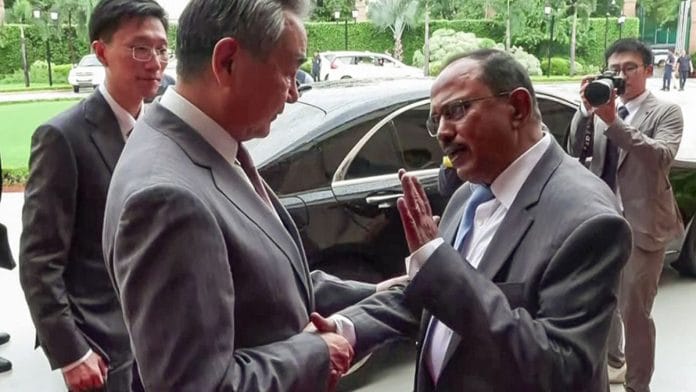New Delhi: Chinese Foreign Minister Wang Yi Tuesday pushed for a “dual-track” progress for ties with India, separating economic ties from the boundary question, during a meeting with India’s National Security Adviser Ajit Doval at the 24th round of Special Representative (SR) discussions.
“Both sides should follow the strategic guidance of their leaders and adhere to the principle of dual-track progress, mutual promotion, and a virtuous cycle in approaching and handling bilateral relations and border issues,” the Foreign Ministry readout of the Special Representative-level talks said. The original readout published in Chinese has been translated to English by online translation tools.
The readout added: “Through dialogue and communication, they should enhance mutual trust, expand exchanges and cooperation, and jointly promote consensus, clarify directions, and set goals in border control, demarcation negotiations, and cross-border exchanges.”
Subsequent to the military clashes in Galwan during the summer months of 2020, New Delhi has maintained that any bilateral engagement can occur only after “peace and tranquility” has returned to the border.
Doval underlined the same in his opening remarks, stating, “I am very happy that since then (the last SR-level talks in 2024) in the last nine months, there has been an upward trend (in ties). Borders have been quiet. There has been peace and tranquility. Our bilateral engagements have been more substantial.”
India’s NSA had underlined that “peace and tranquility” is essential for discussions on other areas of the bilateral relationship during his last Special Representative-level talks with Wang Yi in December 2024. At the time, the Chinese Foreign Minister pushed for discussions around the boundary question to be placed at the “appropriate position” while urging for opening of commercial and diplomatic ties between India and China.
Diplomatic ties between India and China cratered following the clashes at Galwan. However, ties have been moving forward since 21 October 2024, when Indian Foreign Secretary Vikram Misri announced that the two countries had reached an agreement to disengage at the friction points across the Line of Actual Control (LAC).
Two days later, on 23 October, Indian Prime Minister Narendra Modi met Chinese President Xi Jinping on the margins of the BRICS summit in the Russian city of Kazan. The Modi-Xi meet has kickstarted bilateral mechanisms between both countries, including the SR-level mechanism.
Wang Yi is on a three-day visit to India ahead of Prime Minister Modi’s visit to the Chinese city of Tianjin later this month for the Heads of States Summit of the Shanghai Cooperation Organisation (SCO). Doval in his remarks Tuesday confirmed that Modi will travel to China. It will be the Indian Prime Minister’s first visit to the country since 2018.
The thaw in ties between New Delhi and Beijing comes as diplomatic relations between India and the US have hit a rough patch. US President Donald Trump has taken aim at India’s continued purchase of Russian oil, imposing tariffs of up to 50 percent earlier this month. The full set of tariffs are set to take effect at the end of August.
India and China, meanwhile, have maintained peace at the borders, while introducing a number of confidence building measures to improve ties. Beijing resumed the Kailash Mansarovar yatra in the summer of 2025 following a five-year hiatus, while New Delhi has started issuing tourist visas to Chinese nationals since 24 July.
Talks are on for the resumption of direct air services between the two countries, and are expected to be completed before the end of this year. The Chinese foreign minister also assured Jaishankar Monday that Beijing will take steps to address India’s concerns over the export of rare earth elements, fertilisers and tunnel boring machines, as reported by ThePrint.
For India, China’s export curbs on these three key goods has had an economic impact. China exported over $774 million worth of urea—a key crop nutrient used by Indian farmers—in the 2023-2024 financial year. A year later, its exports of urea to India fell to around $42 million, following the imposition of export curbs by Beijing. Earlier this year, it lifted the export curbs to other countries, but did not do so for India. Last week, it was reported by Bloomberg that China has now allowed the export of urea to India.
(Edited by Viny Mishra)
Also read: India-China now seek to ‘move ahead’, peace at borders key—Jaishankar at meeting with Wang Yi






